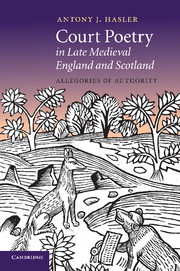Book contents
- Frontmatter
- Contents
- Acknowledgements
- Abbreviations
- Introduction
- 1 Beginnings: André's Vita Henrici Septimi and Dunbar's aureate allegories
- 2 The Bowge of Courte and the birth of the paranoid subject
- 3 “My panefull purs so priclis me”: the rhetoric of the self in Dunbar's petitionary poems
- 4 Translative senses: Alexander Barclay's Eclogues and Gavin Douglas's Palice of Honour
- 5 Mémoires d'outre-tombe: love, rhetoric and the poems of Stephen Hawes
- 6 Mapping Skelton: “Esebon, Marybon, Wheston next Barnet”
- Conclusion
- Notes
- Bibliography
- Index
- CAMBRIDGE STUDIES IN MEDIEVAL LITERATURE
4 - Translative senses: Alexander Barclay's Eclogues and Gavin Douglas's Palice of Honour
Published online by Cambridge University Press: 04 April 2011
- Frontmatter
- Contents
- Acknowledgements
- Abbreviations
- Introduction
- 1 Beginnings: André's Vita Henrici Septimi and Dunbar's aureate allegories
- 2 The Bowge of Courte and the birth of the paranoid subject
- 3 “My panefull purs so priclis me”: the rhetoric of the self in Dunbar's petitionary poems
- 4 Translative senses: Alexander Barclay's Eclogues and Gavin Douglas's Palice of Honour
- 5 Mémoires d'outre-tombe: love, rhetoric and the poems of Stephen Hawes
- 6 Mapping Skelton: “Esebon, Marybon, Wheston next Barnet”
- Conclusion
- Notes
- Bibliography
- Index
- CAMBRIDGE STUDIES IN MEDIEVAL LITERATURE
Summary
To move from Dunbar to Gavin Douglas is to take a considerable leap in status and visibility within the Scottish court. Douglas presented his translation of the Aeneid to his kinsman Henry, Lord Sinclair, after completing it on July 22, 1513, nearly two months before the symbolically fraught battle of Flodden. In the dedication, he refers to another poem, The Palice of Honour, written twelve years before:
To ʒou, my Lord, quhat is thar mair to say?
Ressaue ʒour wark desyrit mony a day;
Quharin also now am I fully quyt,
As twichand Venus, of myn ald promyt
Quhilk I hir maid weil twelf ʒheris tofor,
As wytnessith my Palyce of Honour,
In the quhilk wark, ʒhe reid, on hand I tuke
Forto translait at hir instance a buke:
So haue I doyn abufe, as ʒe may se,
Virgillis volum of hir son Enee,
Reducit, as I cowth, intill our tong.
Be glad, Ene, thy bell is hiely rong …
As we shall see, The Palice features, near its close, a scene in which Venus presents a “book” to Douglas, with a command to translate it. It has become customary to present Douglas's Eneados as the epitome of aristocratic and proto-imperialist epic, and the actualities of Douglas's career would appear to substantiate this.
- Type
- Chapter
- Information
- Court Poetry in Late Medieval England and ScotlandAllegories of Authority, pp. 87 - 107Publisher: Cambridge University PressPrint publication year: 2011



